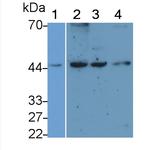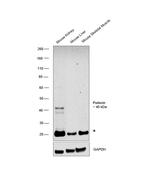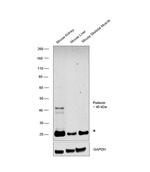Search Thermo Fisher Scientific
Invitrogen
Podocin Monoclonal Antibody (C3)
This Antibody was verified by Relative expression to ensure that the antibody binds to the antigen stated.
FIGURE: 1 / 3
Podocin Antibody (MA5-43645) in WB



Product Details
MA5-43645
Species Reactivity
Host/Isotype
Class
Type
Clone
Immunogen
Conjugate
Form
Concentration
Purification
Storage buffer
Contains
Storage conditions
Shipping conditions
RRID
Target Information
The pathological conditions of SRN1 correlate well with mutations at the NPHS2 gene, where expression of a protein known as Podocin occurs. Abnormal or inefficient signaling through Podocin protein-dependent networks contributes to the development of podocyte dysfunction and proteinuria. The human NPHS2 gene maps to chromosome 1q25-q31 and encodes a 383 amino acid protein. Podocin is an integral membrane protein that appears to fold into a hairpin-like structure with intracellular amino- and carboxy-termini. Transmembrane and cytoplasmic portions of Podocin share homology to the corresponding regions of the stomatin family proteins. Expression of high-order oligomers of Podocin in glomerular podocytes may reflect a scaffolding function that influences proper function of the glomerular filtration barrier, which is necessary for renal stability.
For Research Use Only. Not for use in diagnostic procedures. Not for resale without express authorization.
References (0)
Bioinformatics
Protein Aliases: nephrosis 2 homolog, podocin; nephrosis 2 idiopathic steroid-resistant (podocin); nephrosis 2, idiopathic, steroid-resistant (podocin); NPHS2 podocin; Podocin
Gene Aliases: AI790225; NPHS2; PDCN; podocin; SRN1
UniProt ID: (Human) Q9NP85, (Mouse) Q91X05, (Rat) Q8K4G9
Entrez Gene ID: (Human) 7827, (Mouse) 170484, (Rat) 170672

Performance Guarantee
If an Invitrogen™ antibody doesn't perform as described on our website or datasheet,we'll replace the product at no cost to you, or provide you with a credit for a future purchase.*
Learn more
We're here to help
Get expert recommendations for common problems or connect directly with an on staff expert for technical assistance related to applications, equipment and general product use.
Contact tech support
